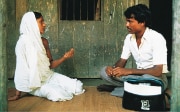Governance
Gender Overview - Mongolia: Desk Study:
This 2014 overview describes Mongolia’s gender situation, looking into local dynamics and summarising publicly available information on gender legislation and gender-related issues in Mongolia. Such information is essential to plan interventions that are context relevant and to integrate gender into programming. The document provides clear insights to identify potential entry points, target groups and partners from the legal and policy review, the gendered situation in the economic sphere, political decision-making, education, health, media, and gender-based violence, as well as relevant gender policies in Mongolia. Since 2014, all SDC Mongolia projects have used this document as a reference to mainstream gender equality into planning, programming and implementation.
Gender Overview - Mongolia: Desk Study (PDF, 90 Pages, 1.6 MB, English)
Supporting Women Representatives as the voice of rural communities, 2015
Forum aims to increase women’s participation in Mongolia’s 2016 elections, 2016


